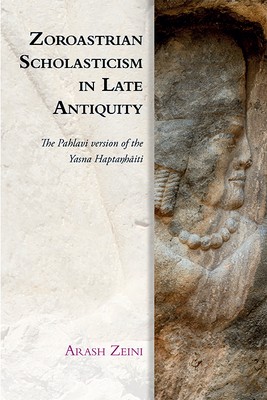
- We will send in 10–14 business days.
- Author: Arash Zeini
- Publisher: Edinburgh University Press
- ISBN-10: 1474442897
- ISBN-13: 9781474442893
- Format: 15.6 x 23.4 x 2.2 cm, softcover
- Language: English
- SAVE -10% with code: EXTRA
Reviews
Description
Examines Zoroastrian exegesis by investigating a late antique translation of an ancient Iranian text
- Challenges the view that considers the study of the Zand an auxiliary science to Avestan studies
- Views the Zand of the YH as a text in its own right and investigates it within the wider Pahlavi leiterature
- Considers the so-called glosses in the Zand for the first time as an integral part of the text
- Offers a variorum edition of the Middle Persian text, refusing to establish an Urtext
In late antiquity, Zoroastrian exegetes set out to translate their ancient canonical texts into Middle Persian, the vernacular of their time. Although undated, these translations, commonly known as the Zand, are often associated with the Sasanian era (224-651 ce). Despite the many challenges the Zand offers to us today, it is indispensable for investigations of late antique exegesis of the Avesta, a collection of religious and ritual texts commonly regarded as the Zoroastrians' scripture.
Arash Zeini also offers a fresh edition of the Middle Persian version of the Avestan Yasna Haptaŋhāiti, a ritual text composed in the Old Iranian language of Avestan, commonly dated to the middle of the second millennium bce. Zeini challenges the view that considers the Zand's study an auxiliary science to Avestan studies, framing the text instead within the exegetical context from which it emerged.
EXTRA 10 % discount with code: EXTRA
The promotion ends in 7d.00:19:54
The discount code is valid when purchasing from 10 €. Discounts do not stack.
- Author: Arash Zeini
- Publisher: Edinburgh University Press
- ISBN-10: 1474442897
- ISBN-13: 9781474442893
- Format: 15.6 x 23.4 x 2.2 cm, softcover
- Language: English English
Examines Zoroastrian exegesis by investigating a late antique translation of an ancient Iranian text
- Challenges the view that considers the study of the Zand an auxiliary science to Avestan studies
- Views the Zand of the YH as a text in its own right and investigates it within the wider Pahlavi leiterature
- Considers the so-called glosses in the Zand for the first time as an integral part of the text
- Offers a variorum edition of the Middle Persian text, refusing to establish an Urtext
In late antiquity, Zoroastrian exegetes set out to translate their ancient canonical texts into Middle Persian, the vernacular of their time. Although undated, these translations, commonly known as the Zand, are often associated with the Sasanian era (224-651 ce). Despite the many challenges the Zand offers to us today, it is indispensable for investigations of late antique exegesis of the Avesta, a collection of religious and ritual texts commonly regarded as the Zoroastrians' scripture.
Arash Zeini also offers a fresh edition of the Middle Persian version of the Avestan Yasna Haptaŋhāiti, a ritual text composed in the Old Iranian language of Avestan, commonly dated to the middle of the second millennium bce. Zeini challenges the view that considers the Zand's study an auxiliary science to Avestan studies, framing the text instead within the exegetical context from which it emerged.


Reviews